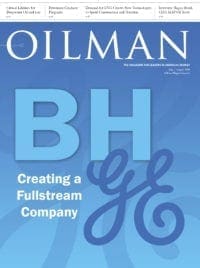The following is an interview with Ragen Borel, CEO, MAP Oil Tools. The interview text has been left in tact, with only minor grammatical adjustments.
Tonae’ Hamilton: How did you become the CEO of MAP Oil Tools?
Ragen Borel: I started working for Serva Group in Wichita Falls, TX, parent company of Map Oil Tools, in 1994 as a warehouseman, basically doing whatever they would let me do. That included sorting O-rings, organizing inventory, filing schematics, light assembly, sandblasting, etc. I was eager to learn as much as possible, working after school and during the summers. I gradually assumed more responsibilities in planning and logistics and eventually took over warehouse operations for Serva’s centrifugal pump facility once I graduated high school.
In 2003, Serva decided to eliminate the Map Oil Tools product line. My father, Glen Holcomb, who had started as a salesman in the early 90’s, was the president of Serva at that time. We both liked the Map line and, rather than see it go, decided to buy the line and move operations from Texas to Louisiana to service the Gulf of Mexico.
We started from zero in 2004 with a two year non-compete, using that time to build clientele and inventory. In 2006 we geared up operations in New Iberia, LA. We’ve since grown to supply 200 service companies and distributors in 70 countries. We have transitioned from a standard downhole tool manufacturing company to developing some of the most cutting-edge technology in the market today for downhole tool activation.
Because I spent time in every department as the company grew, my typical work day can involve Operations, Purchasing, R&D, Corporate Sales, Marketing, and Supply Chain Management. The diversity in my day to day is one of the things I love about what I do. My primary objectives are to ensure that the culture of quality is well maintained within our organization and to deliver profitable results during what is still a very challenging time in the industry. I also work very hard to promote our new technologies and support our engineering team in testing on site and in the field.
TH: What would you say is the goal/mission of MAP Oil Tools?
RB: Quality manufacturing has always been our goal. When we first started, manufacturers built tools out of any material and very few companies employed quality control measures. In 1996, we received certification from ISO and have maintained an audited QMS ever since. We set the bar for mid-size manufacturing when the only companies who were interested in quality control at the time was “The Big Four.” We delved into Lean Enterprise systems with a tremendous focus on managing our supply chain and creating a culture of quality that started with material suppliers and continued to service after the sale.
TH: In what ways have the products offered by MAP Oil Tools transformed the oil industry?
RB: We have historically been a standard service tool company. We manufacture what you could call the “hammers and screwdrivers” of downhole equipment. We provide legacy products and the best possible standard tools. When the downturn hit, we invested a lot in research and development and are now deploying some of the most exciting new technology in the field now. We want to continue moving forward in the next level in downhole tool development, with remote activation and communication downhole. Everyone wants a tool that lowers operating costs, is safer to run, and minimizes environmental risks and we plan to continue our R&D to bring tools like that to market.
TH: You recently launched a new one-trip hydraulic and cementing tool. What impact do you think this tool will have on the oil industry?
RB: The one-trip setting tool saves time, especially in deep water applications. It can save up to 24 hours in service time. Once the tool is deployed, you can just cement through the setting tool instead of making two trips. Whenever you’re looking at offshore applications, that’s big money and our tool saves on those costs.
TH: Aside from the one-trip tool, are there any other new tools or products you have been working on?
RB: Our electronic system, Bluepoint, is installed on a multizone stimulation tool called eValve and that is a tool we have been working on currently. It is a high-profile product we deployed in the field with success. We are going to keep going on the route of electronic development, with our next product being a remotely activated stimulation sleeve.
TH: What sets the one-trip tool or any of your company’s other tools apart from other oil product companies?
RB: Our tool is more compact, which is a big deal when deploying tools. We also ship all over the world and the tools we offer are safer to handle and aren’t bulky. There are just a few companies that offer similar systems, however, those are primarily cumbersome, complex, and costly. Therefore, our tools are much more simple, efficient, and easy to handle.
TH: How does your role as CEO, inspire other women to seek higher positions in the oil industry or other male-dominated industries?
RB: I think the best thing I can do is to demonstrate the importance of upward mobility for women and other minorities present in industries like the energy industry. I demonstrate that culture at my company and embrace the education and development of all kinds of people.
It is important for us to not take for granted that the same face we’re used to is the best face for the industry. There is a tremendous amount of diversity nowadays and the training that we make available for people while promoting from within, creates opportunities that didn’t exist for people like me and others just a few years ago.
TH: What challenges, if there are any, have you faced being the CEO of an oil-based company?
RB: I took over as CEO for Map Oil Tools in 2015 at the start of the most dramatic downturn in the energy industry in recent memory. Nothing could have prepared me for the sacrifices that would have to be made, the tough decisions that had to made, affecting families in our supply chain around the world. Ultimately, those lessons have been more valuable than other experience I’ve shared with my colleagues.
TH: As CEO of MAP Oil Tools, do you have any plans for growth or expansion of your company?
RB: Always. Of course, for the past three years have been about survival, not just for us but for everyone. That doesn’t stop us from investing in R&D, which was important in this environment. We expanded our manufacturing facility during the downturn, when space was more affordable, which has allowed us to be responsive once the demand picks back up. Expanding our product design capabilities is where we are at in terms of growth for the next few years.
TH: In the future, what improvements or new developments would you like to see happen in the oil industry?
RB: I would like to see continued growth of accountability for operations, safety, and product validation within the energy industry. I think accountability for operations no matter where they happen in the world is important. Maintaining environmental and safety guidelines is important for every country.
Tonae’ Hamilton has been a contributor and associate editor to the magazine for two years. She has been writing professionally for almost four years. In her free time, Tonae’ likes to spend time with her three pets, cook, and binge-watch Netflix shows. Tonae' has a Bachelor of Arts in Communication from McDaniel College.





